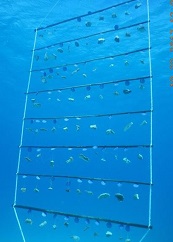#TurksandCaicos, January 25, 2018 – Providenciales –Coral reefs are one of the most valuable resources in the TCI. They support the  economy of the TCI through tourism: white sandy beaches would not exist without healthy coral reefs; and there would be no fish, sea turtles or sharks to entertain snorkelers and divers. Coral reefs are home to vast arrays of species that provide income to the fishermen across the islands, and food for local communities and tourists alike. As witnessed this year, the reefs play a vital role in absorbing the energy from high wave action during hurricanes and protecting the land.
economy of the TCI through tourism: white sandy beaches would not exist without healthy coral reefs; and there would be no fish, sea turtles or sharks to entertain snorkelers and divers. Coral reefs are home to vast arrays of species that provide income to the fishermen across the islands, and food for local communities and tourists alike. As witnessed this year, the reefs play a vital role in absorbing the energy from high wave action during hurricanes and protecting the land.
Following Hurricanes Irma and Maria in September 2017, the marine environment throughout the Turks and Caicos was assessed by the Department of the Environment and Coastal Resources (DECR), with reliance on the cooperation of the Turks and Caicos Reef Fund, School for Field Studies, and dive operators across TCI.

On all islands assessed (Providenciales, South Caicos and Grand Turk), the shallow coral reefs suffered from much greater impact than the deeper areas. Fragile, reef-building corals in shallow areas were broken by high wave action. In some area, colonies of the critically endangered elkhorn coral (Acropora palmata) were hit particularly hard, with large amounts of the coral branches broken off and lying in the sand or seagrass beds. It was also reported that many soft corals were uprooted and dislodged from their natural positions. Shifting of sand around the coral reefs also affected some areas. When corals become covered with sand they are unable produce energy from sunlight or feed actively and, ultimately, will be unable to survive.
It has been noted in some locations that there has been ‘recruitment’ following the hurricanes, where coral larvae settle and begin to grow on bare rock. One unexpected benefit of the hurricanes is that the strong wave action cleans the rocks of algae and other organisms, and creates space for new corals to grow. The DECR will be monitoring these new corals as they continue to grow.

Following severe damage to the Elkhorn coral in Grand Turk, the DECR collaborated with the Turks and Caicos Reef Fund, Blue Water Divers, and  Bohio Dive Resort to rescue broken and damaged coral fragments. A coral nursery was constructed, with 4 ‘coral ladders’ now supporting hundreds of coral fragments that will be cleaned and maintained by DECR staff and volunteers. Eventually they will be transplanted back on to the coral reefs to help with the recovery effort.
Bohio Dive Resort to rescue broken and damaged coral fragments. A coral nursery was constructed, with 4 ‘coral ladders’ now supporting hundreds of coral fragments that will be cleaned and maintained by DECR staff and volunteers. Eventually they will be transplanted back on to the coral reefs to help with the recovery effort.
The DECR would like to thank the Turks and Caicos Reef Fund, School for Field Studies, and all dive operators that assisted with coral monitoring, rescue and general reporting on the state of our reefs.
If you would like to volunteer to assist the DECR with the coral nurseries, please contact the DECR at environment@gov.tc or call 338-4170.
Press Release: TCIG


 News1 week ago
News1 week ago
 Bahamas News6 days ago
Bahamas News6 days ago
 Bahamas News5 days ago
Bahamas News5 days ago
 Caribbean News1 week ago
Caribbean News1 week ago
 News1 week ago
News1 week ago
 Health5 days ago
Health5 days ago
 News1 week ago
News1 week ago















